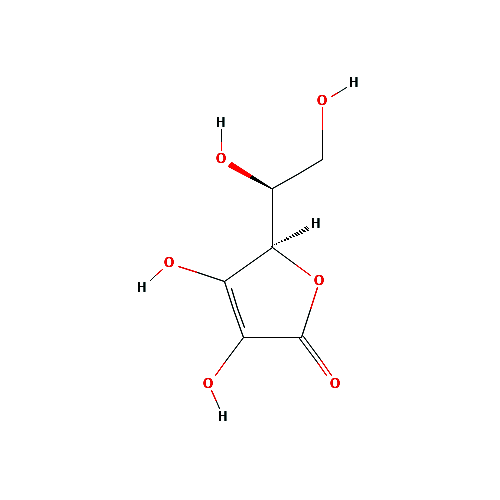Ascorbic acid (Vitamin C)
- Product Name : Ascorbic acid (Vitamin C)
- CAS : 50-81-7
- Molecular Formula : C6H8O6
- Molecular Weight : 176.12 g/mol
- Pharmaceutical Grade : BP / EP / IP / USP
- Therapeutic Category : Vitamins
Global Calcium is one of the leading manufacturers and exporters of Ascorbic acid (Vitamin C) CAS no. 50-81-7, Mineral Actives . We support the customers with exhaustive documentation. As a USDMF & EU-GMP certified global company and an established hallmark for pharmaceutical standards, Global Calcium has stood the test of time since its inception in 1979.
As manufacturer of Ascorbic acid (Vitamin C) we hereby state the following facts about the drug:
Ascorbic acid is a water-soluble vitamin. It occurs as a white or slightly yellow crystal or powder with a slight acidic taste. On exposure to light, it gradually darkens. In the dry state, it is reasonably stable in air, but in solution it rapidly oxidizes.
In 1747, James Lind conducted a trial of six different treatments for 12 patients with scurvy; only oranges and lemons were effective in treating scurvy. In 1928, Albert Szent-Györgyi isolated a substance from adrenal glands that he called ‘hexuronic acid’. Four years later, Charles Glen King isolated vitamin C in his laboratory and concluded that it was the same as ‘hexuronic acid’. Norman Haworth deduced the chemical structure of vitamin C in 1933.
Ascorbic acid is found naturally in citrus fruits and many vegetables. It is an essential nutrient in human diets, and necessary to maintain connective tissue and bone. Its biologically active form, vitamin C, functions as a reducing agent and coenzyme in several metabolic pathways. Vitamin C is considered as an antioxidant. Humans are unable to synthesize ascorbic acid, while other species are able to do so.
The United States Food and Drug Administration (FDA) has granted ascorbic acid GRAS (generally recognized as safe) status for use as a chemical preservative at 21 CFR 182.3013 and §582.3013 (for animal feeds), as well as for use in nutrients and dietary supplements at §182.8013 and §582.5013 (also for animal feeds).
THERAPEUTIC USES AND EFFECTIVENESS OF VITAMIN C:
- Scurvy: It is effective in treatment of Vitamin C deficiency, including scurvy and problems associated with scurvy.
- Skin injuries: Vitamin C is an antioxidant and it has got ability to stimulate collagen formation. This function can help to treat ulcers, burns, wrinkles and injuries.
- Prophylaxis of chronic disease: According to some studies Vitamin C is useful in treating some chronic diseases. Taking Vitamin C supplements might help manage anemia in people undergoing dialysis.
- Taking vitamin C for a few days before and after heart surgery helps prevent irregular heartbeat after heart surgery.
- Emptying the colon before a colonoscopy: Before a person undergoes a colonoscopy, the colon must be empty. This emptying is called bowel preparation. Some bowel preparation involves drinking 4 liters of medicated fluid. If vitamin C is included in the medicated fluid, the person only needs to drink 2 liters. This makes people more likely to follow through with the emptying procedure. Also fewer side effects occur. A specific medicated fluid containing Vitamin C has been approved by the US FDA for bowel preparation.
- Cardiovascular disease: Supplementation with Vitamin C is associated with a reduction in cardiovascular risk, including heart attacks. Some research showed evidences that Vitamin C might be helpful in significant reduction in cholesterol levels and no effect on cardio-protective HDL.
- Immunity: Vitamin C stimulates several immune functions, such as cell motility and phagocytosis, resistance to oxidative damage, and interferon release. Whether this leads to superior immune function as a whole is a topic that is still under study. Most of the research shows that taking 1-3 grams of Vitamin C might shorten the course of the cold by 1 to 1.5 days.
OTHER/NON THERAPEUTIC USES OF VITAMIN C:
- Personal care: It can be used in cosmetics, skin and hair care products and personal care products like make-up products.
- Food and beverages: It is usually used as a preservative, acidity regulator, color fixative and nutrition supplement.
ADDITIONAL INFORMATION:
- Vitamin C is known to support the immune system in its fight against bacterial and viral infections. Direct and indirect evidences reveal the role of vitamin C in treating COVID-19 patients.
- Studies have shown that Vitamin C can help improve antiviral treatments. Some studies where Vitamin C was injected intravenously have shown promising results in COVID-19 treatment. In a recent study published by a group of researchers in Mexico evaluated the use of antioxidants as potential adjuvant for the treatment of COVID-19, with a specific interest in the utility of these agents in reducing or preventing the neurological symptoms of this disease.
Global Calcium is a leading manufacturer of this drug. We manufacture this pharmaceutical drug and make it available to domestic and overseas market



